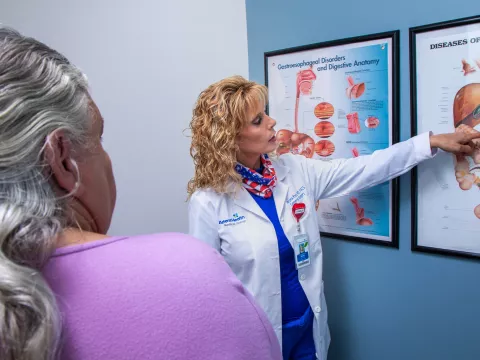- AdventHealth

As a busy man, you have so many responsibilities that you may find yourself putting health and wellness on the back burner. Men often delay screenings that could have an enormous impact on their health.
After a long and courageous battle, NASCAR driver John Andretti, nephew of racing legend Mario Andretti, has died from colon cancer at age 56. His tragic diagnosis with stage 4 in 2017 is a solemn reminder that early detection of disease can be potentially life-saving.
In fact, a colonoscopy can not only detect the presence of cancer, it can sometimes prevent it from even developing in the first place.
Here’s what you need to know about important preventive screenings. Talk to your doctor to find out which may be right for you.
Colorectal Cancer Screening
For men of average risk with no family history, it is now recommended by the American Cancer Society that screenings for colon cancer begin at age 45. This could change based on your risk for colon cancer. Risk factors include:
- Family history of colon cancer
- Personal history of certain types of polyps
- Personal history of inflammatory bowel disease like Crohn’s or ulcerative colitis
- Personal history of radiation to the abdomen or pelvis
Being overweight and consumption of red/processed meat, tobacco use, alcohol consumption and diabetes have also shown links to increased risks for colon cancer.
There are several different ways your primary care physician can screen for colon cancer, and they can recommend a colonoscopy if needed.
Lung Cancer Screening
The leading cause of cancer-related deaths among men and women in the United States is lung cancer. Globally, the majority of smokers are men. There are criteria now used to screen for lung cancer, and you should discuss this with your primary care provider to determine if you are eligible. Characteristics for an individual to be screened include:
- Being age 55 – 74
- Having smoked at least one pack of cigarettes per day for 30 years, or two packs a day for 15 years
- Either currently smoke or quit within the last 15 years
Smoking cessation is a vital part of this process. Ask your doctor for help quitting.
Prostate Cancer Screening
This is the most common form of cancer discovered in men. Screening for prostate cancer has evolved over many years. Although there are no current guidelines to start screening at a certain age, you are encouraged to start discussing prostate cancer screening with your primary care physician at age 50. However, if you are at a higher risk for prostate cancer, this discussion should start as early as age 40 – 45. Risk factors include:
- Being African-American
- Having a first-degree relative (father, brother) with prostate cancer younger than age 65
- Having a known genetic mutation like BRCA in the family
Screening includes a blood test for prostate-specific antigen or “PSA.” An examination of the prostate by your physician might be done, only if deemed necessary. There are no obvious symptoms of early prostate cancer, which is why it is important to discuss screening for it. If it is found and treated early, the chances of survival are very good.
#CheckIt4Andretti
You can honor John Andretti’s legacy by prioritizing regular colon screenings and by sharing the hashtag #CheckIt4Andretti on social media. Talk to your doctor about what preventive screenings may be right for you.



